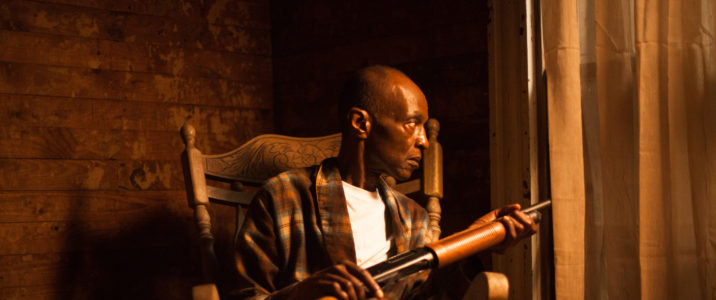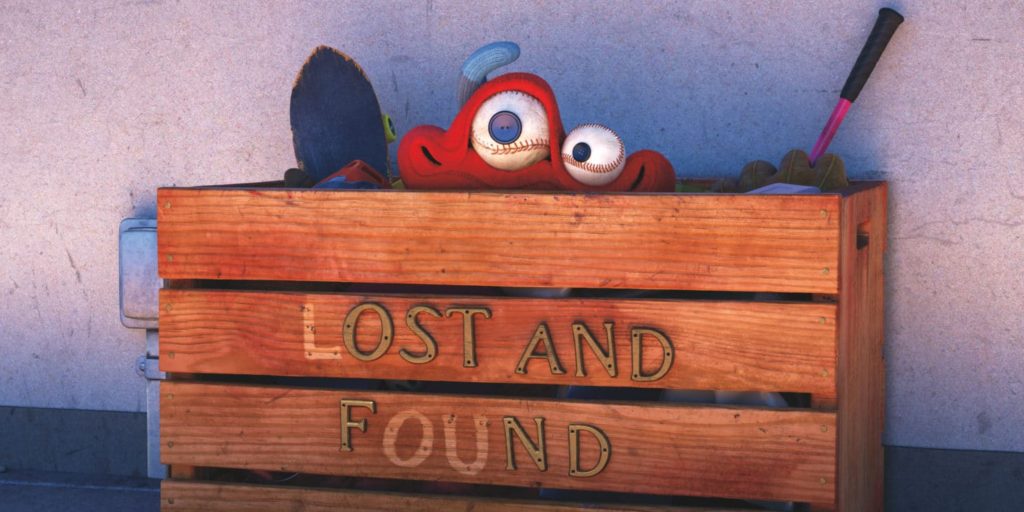The short film nominees have always been something of a crap shoot. There will be many works you’ll see which are passable, but not exceptional, while every now and then, you’ll discover a genuine treasure. This year, the shorts nominated this year really stand out due to their ability in covering a variety of topical issues in 2017; of love and loss, of division driven by fear and unity through compassion, of nature interacting with technology, and the struggle to decipher truth from fiction.
Here is an overview of the short film nominees:
Best Animated Short:
Dear Basketball
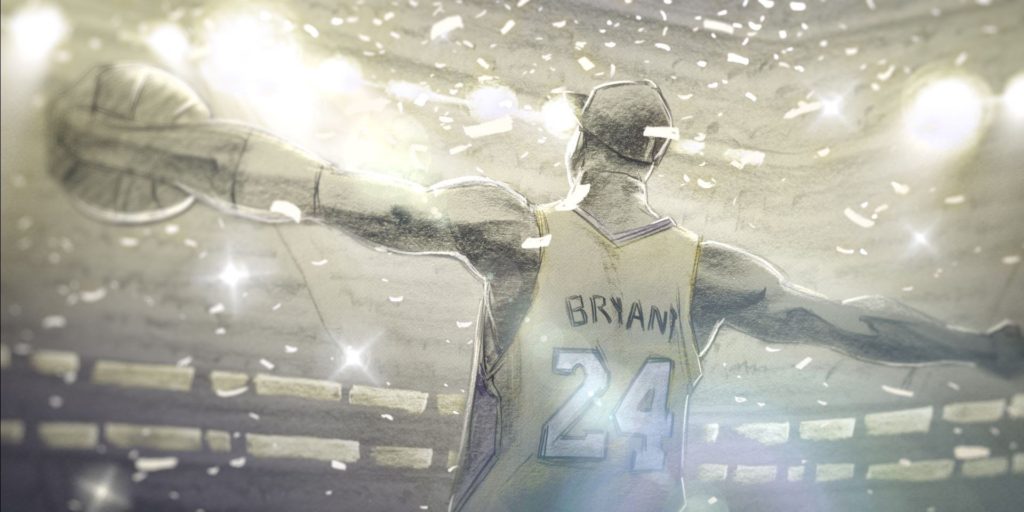
Probably the most prominent nominee of this category, this is based on a book written by NBA superstar Kobe Bryant (also serving as narrator). The short assumes the form of a letter written by Bryant to the sport of basketball as he announces his retirement, while reminiscing about his childhood dreams of being an NBA player intercut with his triumphant moments on the court. It comes off as self-congratulatory and somewhat ego-inducing, with legendary composer John Williams providing an uplifting, triumphant score to accentuate his accomplishments. It’s elevated, somewhat, by the direction of master Disney animator Glen Keane, as he fluidly transitions back and forth between Bryant as a boy to his NBA career. The animation has a homemade, sketchy look, with adult Kobe having more detail drawn into his design, contrasting the nostalgia of childhood with the invigorating experiences as an NBA player. Overall, a self-indulgent but well animated short.
Negative Space

This one has a man reminisce on bonding with his father through the luggage he would pack in his suitcase. Told through Claymation, the film takes a surreal, Wes Andersonian approach as our narrator imagines himself as a tiny figure being placed in a suitcase or walking on a track that’s a zipper line. The story ends on a bittersweet, if somewhat anticlimactic note.
Pixar has had a long history of taking inanimate objects and otherworldly creatures and giving them sentience, starting with their first full length feature, Toy Story almost 23 years ago. In their latest short, released last summer with Cars 3, the title character is a composite of discarded items in a lost & found box at an elementary school. When the box notices a schoolyard bully taking other kid’s items, the creature decides to give him a piece of its mind, culminating in an understanding between the two and ending on a bittersweet note, as expected in Pixar’s body of work. The animation of Lou, an amalgamation of clothing, toys and tennis balls for eyes, is impressive as it moves its’ way across the playground and changes form. Another solid entry from Pixar.
Revolting Rhymes

The longest of the animated short nominees, this one is based off the collection of fractured fairy tales written by Roald Dahl. The film opens with a wolf (Dominic West) entering a cafe as he sits by a rather startled but kindly woman. As they get acquainted with each other, she tells him how she’s babysitting a couple kids across the street. The Wolf notices she’s carrying a book of classic fairy tales and, scoffing at their inaccuracies, proceeds to tell her the “true” story behind classic characters such as Snow White and Red Riding Hood. The character designs have a relatively basic geometrical design, with circles or cones for heads, and the backgrounds have a simple charm, like they were conceived by children (i.e. paper cutout of flames for a fireplace, a 2D face on the Magic Mirror). It also has a tender heart at the center, displayed in the relationship between Snow White and Red Riding Hood, in the midst of its more zany characters, courtesy of Dahl’s wicked sense of humor, including the Seven Dwarves as failing gamblers and a scrupulous Pig Banker who reads a magazine called The Pun. It has an abundance of laughs and charm coupled with a darkly ambiguous ending and could be an upset in the category.
Garden Party

I’m not sure if this one will win, but out of all the nominees, this one is easily the best. Set in a backyard, we see frogs and other amphibians noticing the owner of the house isn’t home, so they decide to poke around and partake in various activities, including a couple spending some time underneath the bed sheets (any fornicating is left off screen), and a large toad indulging in sweets. As the short progresses, we have the feeling something terrible has happened in this place, with bullet holes in the glass window and the occasional ominous music playing, culminating in a spectacular pool party with a killer last shot. The lighting and textures are so nuanced and detailed, you could look at still shots and be fooled to thinking you were looking at real life photography. The illusion is broken occasionally by the character animation, but the deliberate pacing and potent atmosphere makes this a thoroughly engaging experience, and by far the standout of the group.
Best Live Action Short:
DeKalb Elementary
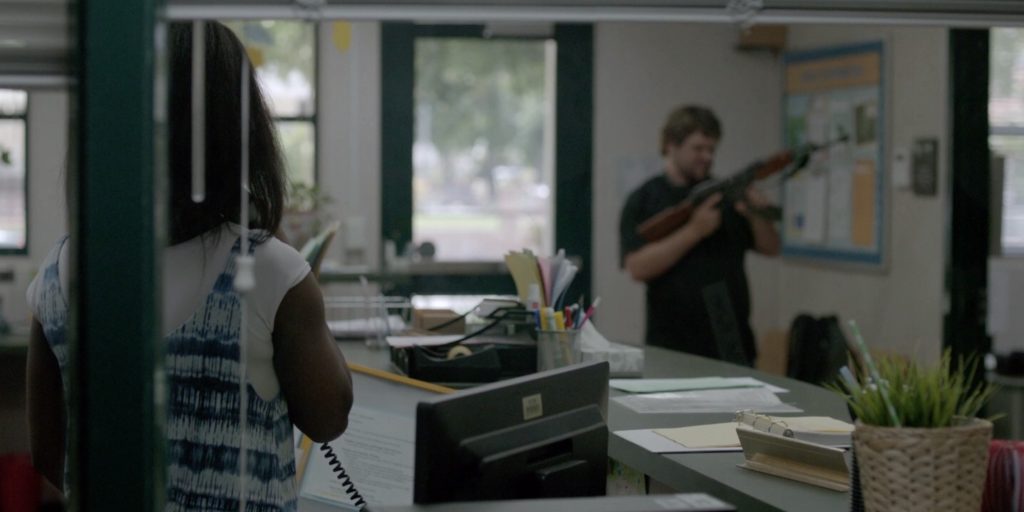
A topic that’s been addressed for a long time, sadly, is the mass shootings all-too prevalent in this country. Over the years, we have seen countless men, women and children lose their lives meaninglessly through high-grade assault rifles, and with the aftermath comes anger, as well as paranoia on whether one will live tomorrow, if someone else will be a victim of these mindless killings. Which makes us appreciate all the more when we are able to preserve the most treasured gift which has been given to us; life. Inspired by actual events, the story begins with a long, static shot as we watch a school faculty’s normal routine fall apart when a young man enters, wielding an AK 47. He lets the staff flee while keeping the receptionist hostage as means of using her to relay his demands to the police. But as the situation continues, the shooter displays signs of uncertainty, taking a swig from a water bottle he keeps in his backpack, and the receptionist tries reaching through to him and convince him to turn himself in peacefully. The action is located primarily inside the reception office, giving the feeling we’re watching a two-person play. Thankfully, Tarra Riggs as the receptionist, and Bo Mitchell as the shooter, carry the film with their intense, understated performances. It’s white-knuckle filled tension, and when it draws to a close, we can finally exhale. A raw, minimalist, and powerful piece of work, worthy of winning the award.
The Silent Worker
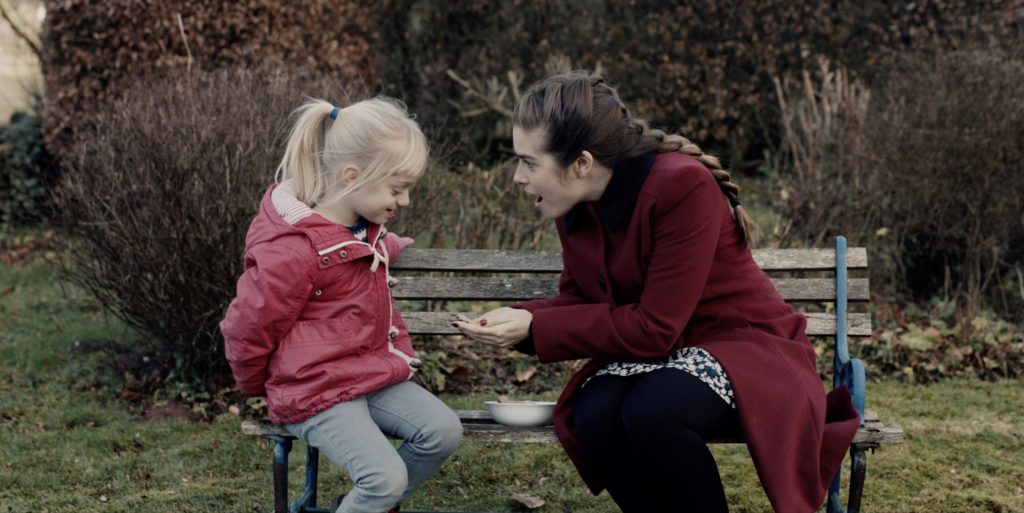
A social worker named Joanne (Rachel Shenton, who also wrote the script), is assigned by an upper class British family to care for their deaf child, Libby (newcomer Maisie Sly). Through sign language, the two are able to communicate and form a strong bond, but Libby’s mother wants to discontinue the lessons so that her daughter can receive a more normal education like other children. The short is well-intentioned, discussing important social issues regarding deaf children receiving a lack of education in sign language and communication, particularly in the U.K. but the execution comes off as heavy-handed and cheesy. During a montage of Joanne and Libby enjoying a walk in the park, there’s a shot of them speaking in sign language to each other on a hill against a sunset, looking straight out of a Hallmark card. Even the opening shot of Joanne riding towards Libby’s house on a bicycle in a red coat, gives her the appearance of Mary Poppins meets Juliette Binoche in Chocolat. Plus, the motives of the parents, particularly the mother’s decision in separating their daughter from Joanne, feel muddled and insufficiently explored. It will probably shed enough tears from voters to win the Oscar, but I found it a noble, yet sappy piece.
My Nephew Emmett
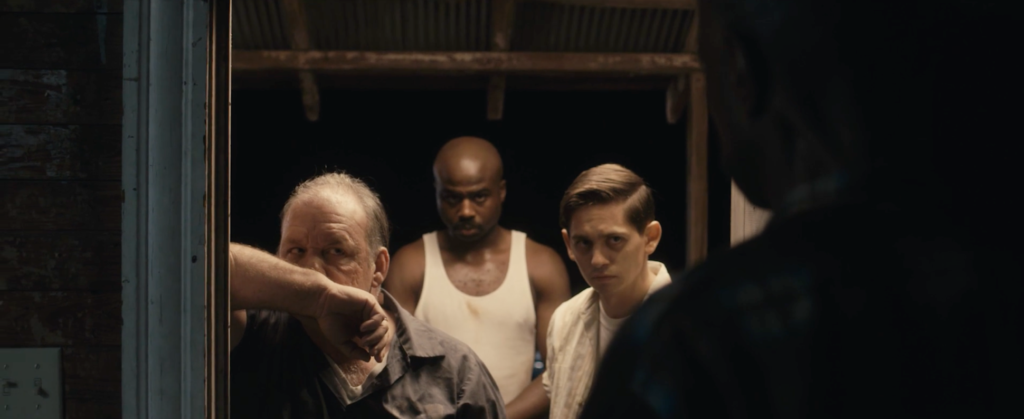
This film dramatizes the events leading up to the abduction and brutal murder of Emmett Till in Mississippi during the late summer of 1955, as seen through the eyes of his uncle, Mose Wright. One of the most notorious murder cases in the Deep South, and a major precursor to the Civil Rights Movement, the foreknowledge of the story’s brutal outcome fills us with dread. The tension reaches its’ peak in the short’s centerpiece, when Roy Bryant and J.W. Milam come to take Till away. Joshua Wright captures the fear and desperation on Wright’s face as he pleads for them to spare his nephew, going so far as offering to take his place. But all he can do is watch his nephew be taken away from him forever. The tension and loss is felt, but it’s undermined by an unnecessary coda showing Wright’s interview as he notices the cameraman is black, probably signifying his awareness of the effect his nephew’s murder will have on the African-American community in this country. It has its effective moments, but it’s not quite as powerful as DeKalb Elementary.
The Eleven O’Clock
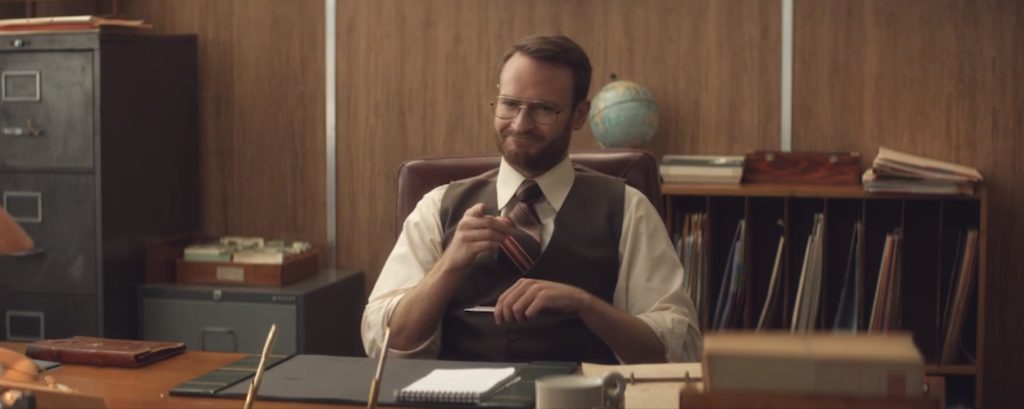
The silliest nominee in the bunch, it focuses on the madcap escapades of a psychiatrist trying to maintain his sanity while having an appointment with a patient who is convinced he himself is a psychiatrist. The quick-fire delivery and chemistry between the two actors brings a lot of laughs, as they share a dynamic similar to the one between Richard Dreyfuss’ flustered psychiatrist and Bill Murray’s irritating but lovable patient in What about Bob? The film has a twist that tries to make our lead, as well as the audience, question the reality we’re witnessing, which doesn’t succeed in execution as much as the filmmakers would’ve hoped. But it’s a madcap romp that will leave you in stitches.
Watu Wote: All of Us

The last of the nominees focuses on the real life terror attack on a bus occupied by Christian and Muslim militants from Al-Shabaab in December 2015. The Muslim passengers, led by Salah Farah, refuse to single out any fellow Christian passengers at the risk of everyone being killed. The hijacking sequence is suspenseful, with solid performances, particularly from Abdiwali Farrah as Salah, but the film suffers from its main character, a Muslim-fearing Christian whose family was murdered by Al-Shabaab. She undergoes a life changing arc in this encounter that unfortunately comes off as cliched and a bit manipulative. If the focus of the film was through Salah’s eyes, specifically chronicling his decision to take a stand against his religious peers in the name of humanity and compassion, it would have made for a more powerful piece.
Best Documentary Short:
Edith+Eddie

An elderly, married biracial couple in Virginia (aged 95 & 96, having met 10 years ago) are threatened to be separated when Edith’s daughter, Patricia, wants to take her mother with her to Florida so that she can sell the house and earn some money from it. The couple fights to stay together with help from Edith’s other daughter, Rebecca, but alas, this story doesn’t have a happy ending. The early, intimate passages where we see the couple together set us up for the heartbreak we are about to witness. There are a couple of interesting decisions done by the filmmakers; the most wrenching scene, where Edith is being taken away under the supervision of her appointed guardian, Jessica Niesen, is not shown as the screen goes to black, but we can hear the audio, as visuals would make the scene possibly too hard to bear. Patricia is mentioned several times, as her sister Rebecca talks about how distant she is with her mother and how she has an abusive husband, making it an unsafe environment for Edith to live in. However, one of the social workers who has come to take Edith away tells her that her mind is foggy and she is only recounting whatever unpleasant memories she has had about Patricia and her spouse as being implanted in her mind by Rebecca. We never get Patricia’s side of the story, so it’s unknown whether Rebecca or the social worker is telling the truth (the most we get of Patricia is a distant shot at the climax). It’s still an emotional piece, and there won’t be a dry eye by the end.
Heaven is a Traffic Jam on the 405
This one focuses on the life and works of artist Mindy Alper, known for her paintings and papier-mache sculptures of human subjects that look like a slightly more appealing variat of Ralph Steadman’s figures. We get an insight into her troubled childhood, including her tumultuous relationship with her parents, repressed traumatic memories of assault, and her decline into depression as an adult, reaching its low point as she commits herself to a mental hospital and receives Electroconvulsive therapy, causing partial permanent brain damage. Speaking at a slow pace and pronouncing years in single digits, (ie 20 becomes “Two-Zero”), Alper isn’t afraid to talk about the ugliness inside her head, how her sight and hearing is heightened by her surroundings. This is reinforced with the visual and sonic distortion of visions of traffic and children screaming, not unlike how Lynch distorted footage in his last season of “Twin Peaks”. But it also displays a great amount of empathy for its subjects as Alper’s mother expresses regret over her choices as a parent, as well as her father’s inability to display pride in her work, and we are inspired to see her overcome her demons and create impressively detailed works of art, finally receiving the love she has long sought after.
Heroin(e)
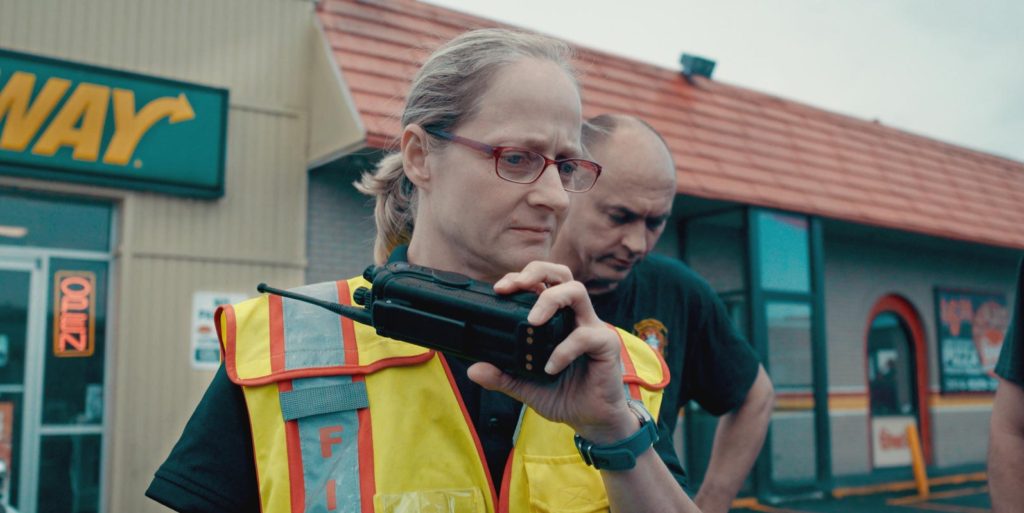
Produced by Netflix, this documentary focuses on the opioid crisis in Huntington, West Virginia, and the various groups attempting to combat it. They include Necia Freeman, leader of a ministry called Brown Bags and Backpacks, which offers bagged lunches to drug addicts; Deputy Fire Chief Jan Rader, serving as a medic and first responder; and Judge Patricia Keller, who serves more as a loving mother figure and teacher than a judge. The town is considered to have one of the worst cases of opioid addiction in the country, with up to $100 million in health care costs from Cabell county alone. It’s a case of law enforcers working against insurmountable odds, saving kids that overdose on an almost daily basis. With the powerful hold addiction can have on people (one drug user likens getting high to “kissing Jesus”) they don’t expect this problem to go away anytime soon. But their compassion, their spirit and tenacity makes us appreciate the dedication Freeman, Rader and Keller, among others, have for their jobs.
Traffic Stop
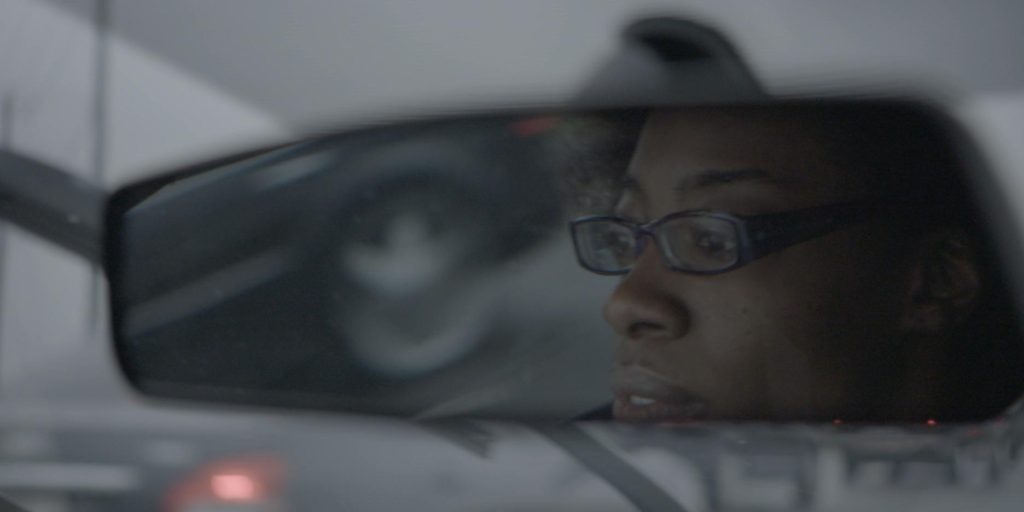
On June 6, 2015, in Austin Texas, Officer Bryan Richter pulled over Breaion King for allegedly speeding. He forcibly pulls her out of her car and tackles her to the ground, as she screams, “Are you serious?” We then cut forward in time as King tells us about her life and living, serving as a teacher to little kids, and her ongoing struggle in coming to terms with her identity as a black woman. As we hear her stories and get to know her more, our empathy makes the feeling all the more jarring when we suddenly cut back to the footage of her arrest, as she’s screaming her innocence, tears coming down her face bears an expression of absolute fear. Our collective knowledge of police treatment of African Americans in the past, coupled with seeing Richter giving his account to a couple of fellow officers, albeit with some erroneous details, prompts us to fear for her safety as well. We never get any interviews with fellow police officers involved in the case, but there’s a conversation between King and her driver as she’s being taken to jail that emphasizes the paranoia present in both King and the police force toward the other. As she asks him questions about whether attacks against black citizens and innocent people happen a lot, the driver responds by asking, “Do you suppose it goes both ways?” and explains how there are many African Americans citizens because of “violent tendencies” in the black community. With fear and paranoia, it becomes hard to look at a person as more than a statistic; but if you start seeing them for their human qualities, as we do with King in this film, connections are established as fear gives way to empathy. And that goes both ways.
The most fascinating film in this category, it chronicles the experiences of former convicts enrolling in a training program for a restaurant called Edwins. Located in Cleveland, it is as well-known for its workforce consisting of former criminals as it is for its exquisite French cuisine. Similar to other types of films involving rehabilitation, we follow the journeys of several trainees as they explain their interest in cooking, with one of them recalling his mother watching Julia Child a lot when he was a kid, and attempting to overcome their personal demons to pass the training program. But a major twist in this story appears in the form of the owner, Brandon Chrostowski, who himself was previously convicted on drug charges. He is very candid on his past mistakes, almost to the point of self-deprecation when describing himself at one point as “trash”. Yet working at the restaurant gives him the sense that he “can put on a suit and feel great” as he overlooks his establishment. The film ends on an extremely touching note as Brandon reads a heartfelt letter to his son detailing his hopes for him and the legacy he wants to leave behind for his son. In a country where we turn so many prisoners coldly away, robbing them of freedoms such as the right to vote, it’s great to see a story where a man, learning from his experiences, attempts to give others what he himself managed to obtain: a second chance.
